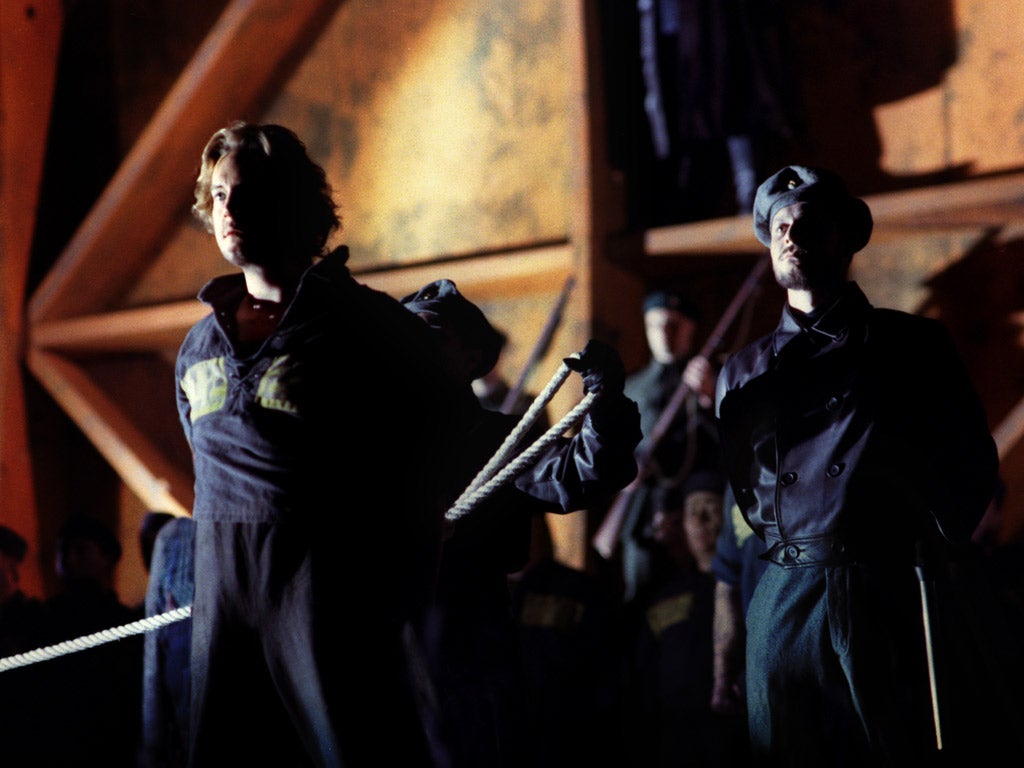Billy Budd, Coliseum, London Sacrifices, Spitalfields Festival, London Vienna Philharmonic/Rattle, Barbican Hall, London
Enlisting dehumanises all, bullies and witnesses alike, says an Expressionistic new production of a Britten opera

Spiralling high over the tarry swell of the strings, the bird-like flutes in Billy Budd suggest a freedom unimaginable to the crew of HMS Indomitable. Pressed into service, flogged into submission, teased and frustrated by the promise of battle, the sailors in David Alden's lightless, airless production of Britten's opera are adrift in a floating gulag. The sharp shadows of Expressionist cinema replace the wash of moonlight in Paul Steinberg's industrial set. Instead of timber, there is iron. Instead of the green-blue hues of the open sea, the murk of the midnight zone: the domain of Matthew Rose's Claggart.
Where Neil Armfield's 1998 staging of Billy Budd emphasised the horizonless expanse of the sea, Alden emphasises the bathypelagic darkness of the ship. Pitiful in his guilt-ridden dotage, Kim Begley's Captain Vere is stripped of substance in the central drama, an empty figurehead in spotless white, a puppet, a piñata. Even Benedict Nelson's Billy is reduced: a pleasant, unremarkable chap, less beauteous than Duncan Rock's Donald, less alert than Michael Colvin's Red Whiskers, less tender than Gwynne Howell's Dansker. Why him? Though graphically illustrated in "O beauty, handsomeness, goodness", Claggart's intense sexual attraction to Billy seems random, a casual extension of his brutality to Nicky Spence's bespectacled Novice and his manipulation of Daniel Norman's Squeak. Instead of the provocative effect of one man's goodness on one man's evil, Alden's focus is on the systematic dehumanisation of all men: a process carried to its natural conclusion after Billy's execution, when the crew can do nothing but snarl and moan like beasts, devoid of language, under a battery of truncheons.
Conductor Edward Gardner has made some interesting choices in his reading of the score. Vere's opening monologue is brisk and unsentimental. The strings have adopted a grainy timbre, dry as ships' biscuits. Only in the foggy sob of the saxophone solo, the milk-white flutes and the fronded harp-writing does any dreaminess waft through this stygian dystopia. Magnificent at full throttle, an enlarged chorus observes Britten's detailed dynamic markings to the letter. Individual performances are strong, from Rock, Colvin, Howells, and officers Henry Waddington and Jonathan Summers. Yet something is missing. In drawing the curtain down at pivotal points, Alden breaks connection with his audience, forcing us to look away. Just as Vere washes his hands of Billy's fate, so, alas, do we.
Vignette Productions and La Nuova Musica's double-bill of Charpentier and Carissimi oratorios, Sacrifices, left a similarly bleak impression. Staged by Andrew Staples just a few days into his run as Ferrando in Così fan tutte at Opera Holland Park, Sacrificium Abrahae and Jephte opened and closed to a Scandinoir soundtrack of bleeping life-support machines and doomy synthesiser. Part nightmare, part ritual, Staples's concept revolved around a morgue trolley, a string of lightbulbs and two actors, Sean Smith and Siâ* Goff, whose mute terror mirrored the twin stories of Isaac and Iphis, both sacrificed (or nearly sacrificed) by their fathers as a demonstration of faith.
Dressed as mourners, the vocal consort sang beautifully but moved awkwardly. Directing from the organ, with instrumental interpolations drawn from Sébastien de Brossard's violin music (soloist Bojan Cicic), David Bates favoured slow tempi and luxuriant textures. Among the soloists Mark Chaundy's fiery Jephthah and Simon Wall's mellifluous Abraham were outstanding. The overlapping dissonances of "In carmine doloris" were dizzying in the generous acoustic of Shoreditch Town Hall, underpinned by the baleful seam of cello, theorbos, lirone, organ and harpsichord.
The Vienna Philharmonic purred and preened its way through Schumann and Brahms's Third Symphonies at the Barbican last weekend, with only three more women on stage than the (all-male) Billy Budd. Aside from the pointed cross-rhythms and some giddy gear changes, the players paid scant attention to their conductor, Sir Simon Rattle, or to the stylistic differences between the two works. The sound was a brilliant gleam, the atmosphere that of an ensemble supremely confident in its interpretative traditions (it premiered the Brahms in 1883), the effect quite soporific. Only when taken out of its comfort zone into the blistered textures of Webern's Six Pieces for Orchestra did the generalised dewiness crystalise into something specific and exciting. It would be wonderful to hear the VPO play Schumann and Brahms in an equivalent spirit of discovery.
'Billy Budd': to 8 Jul (020-7845 9300)
Critic's Choice
David McVicar's new production of Berlioz' Les Troyens opens at the Royal Opera House tomorrow. Antonio Pappano conducts, and Anna Caterina Antonacci, Eva-Maria Westbroek and Bryan Hymel lead the cast. At the Royal Festival Hall, the Philharmonia's Still Point of the Turning World series concludes with Mahler's Resurrection Symphony (Thu).
Subscribe to Independent Premium to bookmark this article
Want to bookmark your favourite articles and stories to read or reference later? Start your Independent Premium subscription today.

Join our commenting forum
Join thought-provoking conversations, follow other Independent readers and see their replies